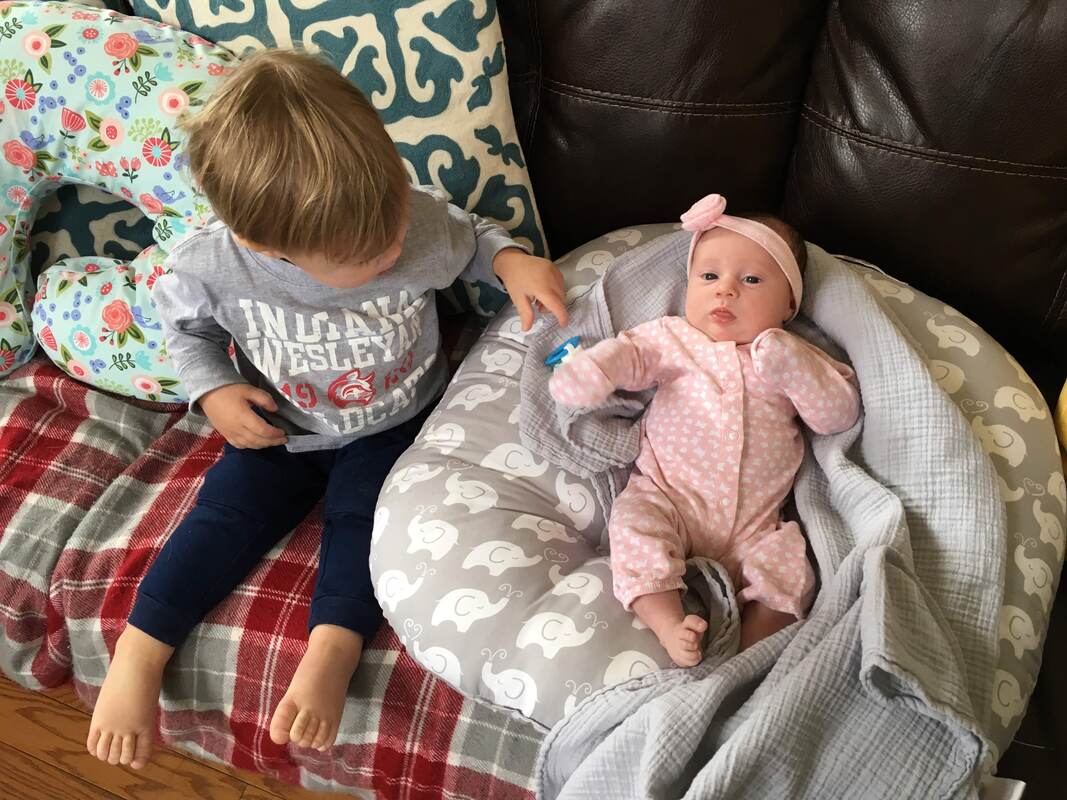|
When I was expecting my second baby, I spent a lot of time worrying . . . Would my firs child feel jealous, left out, less special? Would he act out or have a regression? Would he love the baby? Would I have enough time for him? What would he do when I was stuck nursing on the couch for 40 minutes? Would the baby's naps interfere with our life? How would I handle juggling two kids? Would I be able to love them both the same and give them enough attention? What if I didn't love the new baby as much as I already knew I already loved my toddler? And how would I cope when I couldn't just "sleep when the baby sleeps" when there's also a toddler at home? Would the new baby sleep well, or be fussy and difficult? All these worries crept into my head frequently.
I honestly think the worry of it all stole a lot of the joy from the last few months I had with just my toddler. If I could go back to that time, I would have soaked up those moments even more and pushed those worries out every time they popped into my head. Because the truth? The transition went great. It wasn't perfect, it went much more smoothly than I feared. It's common for parents to have worries making a transition from one to two kids. It's also common for toddlers to experience regressions when a new sibling comes, but the good news is - it will be ok, and it won't last forever! If your toddler does experience a sleep regression when a new sibling comes into the home, you can be intentional and the regression should only last a few weeks. Here are some tips: 1. Sleep train before new sibling comes, and don't make any big changes right when a new sibling comes. One of my friends moved her 16 month old, who already wasn't a great sleeper, from his crib, to a toddler bed right when his baby sister arrived, and gave the crib to the new baby, then older brother had a major regression and meltdown, and it lasted for weeks (maybe even months). His sleep got worse and worse. My friend told me she regretted making that change right then, and wished she would have kept him in the crib longer. Don't rush to move your toddler out of their crib too early or drop a nap too early. Many toddlers aren't ready for a big kid bed until at least 3 years old. The good thing about newborns is, even if you want them to eventually have their older sibling's crib, a newborn can sleep in a basinet or a pack n play for months, so you don't have to rush to make the change right away. If your toddler is not sleep trained and is struggling with sleep, always sleep train and take care of any issues or transitions before the new baby comes. 2. Keep your toddler's schedule and bedtime routine as consistent as possible. Consistency is key for toddlers and sleep. Wake them up at the same time every day, put them down for a nap at the same time every day. Start your bedtime routine and bedtime at the same time every day. Keep the routine consistent. It can be tempting to just let them sit and play on a phone or watch a show at night before bed while you're dealing with the baby, and I TOTALLY get it if you need something to keep them occupied and you're by yourself at bedtime, but resist the urge to sit them in front of a screen before bed. The blue light from the screen can disrupt sleep, and it also disconnects you from their bedtime routine. Babywearing can save the day when you're by yourself with a new baby and a toddler, especially during the bedtime routine. Try to stay engaged with your toddler and keep that time before bed special for them. 3. Let other people help. I was so grateful for family and friends who helped with my toddler after the new baby was born. They took him for play dates, and entertained him and helped him still feel special so I could focus on the new baby. I remember someone asking how they could help me the first week, and I asked them to come at 7:30AM and get up for the day with my toddler so I could spend the morning with my new baby. 4. Spend special time with your toddler. Put your toddler to bed at least one night a week. Even though it's amazing for people to help with your older child, try to get in at least once a week for bedtime and make it a special time with just you and your toddler, even the first week home with the new baby. Find special time to spend every day with just your toddler, even if it's just a few minutes of play time each day. 5. Don't give in or start any new habit during sleep regressions (or revert back to any old habits). Don't start allowing your toddler back into your bed again in the middle of the night or start laying with them or patting them to sleep. Don't start giving snacks or bottles in the middle of the night again or sleeping on their floor. If you need to, go back to your sleep training technique. It's tempting to feel bad for them for the big changes they're going through and want to give in during bedtime battles or middle of the night wake-ups, but this will only lead to more sleep problems. Sleep is one area it's important to stay strong and consistent. 6. Don't put pressure on your toddler or yourself. I remember the first day we came home from the hospital, one of my friends came over and her toddler was the same age as my son, and her toddler was very interested in my new baby- singing to her and just in awe of her, wanting to "hold" her and was so sweet to her. My son, who was 19 months old, literally didn't care. At first, I felt bad and wanted him to care more. But keep in mind that it's ok for your toddler to not be interested. Now, my kids are 2 and 4 years old and are literally best friends. They are SO sweet to each other. They never fight. They play together so well. I was worried my son wouldn't like his sister because he didn't care much about her when she was a baby, but that's ok! Don't put pressure on your toddler to respond a certain way. 7. Let your toddler help. If your toddler wants to, give them a special job to help with, such as getting you a burp cloth or clean diaper or singing to the baby. At 19 months, my son was just starting to understand following my directions about getting things for me. He was so proud when he was a big helper. 8. Give your toddler grace, and give yourself grace. If your toddler does start to act out or have a regression in any way, remember that it's normal. It could be a way of seeking attention or acting out their feelings of jealousy or frustration with not having as much of your time. Be patient with them, give them lots of love and grace, and lots of praise for good things. Give yourself grace when you're exhausted and your toddler is melting down and your new baby won't let you set them down, or when your toddler is bored during your 40 minute nursing or bottle feeding session with the sibling. Don't let mom-guilt (or guilt) set in or make you feel like a failure. 9. Give a special new comfort item. Some people give their toddlers a new gift "from" the new sibling. You could give your toddler a special comfort item for bedtime, such as a stuffed animal or special pillow or blanket or some fun pajamas with their favorite character on them. 10. Don't drop the nap too soon. Even if your toddler starts protesting naps or bedtime, don't make the mistake of dropping it before your toddler is really ready. Most toddlers still need to nap until at least 3 years old (some even longer!). Your toddler needs between 10.5-12 hours of sleep at night and 1-3 hours of sleep during the day. If your child isn't getting enough sleep and becomes overtired, they could end up in an overtired cycle- sleeping worse because of being overtired continuously. Break the cycle and get them back on track by keeping the nap and moving bedtime up earlier. Give yourself grace with your schedule and going out, your meals, your housework. And remind yourself the season of having a newborn and an older child won't last forever. Eventually, your newborn will be old enough to walk and talk and play and your kids will be playmates and have fun together. I wish I wouldn't have worried so much during my pregnancy. My son didn't have a major regression, act out, or become jealous. My new baby was very flexible and took some naps at home in her crib, some in the baby carrier or stroller while we went to a park or on a walk or a play date, and some naps in my arms. The love I felt for my son multiplied and I had more than enough love for both of the kids. Don't stress about your newborn's schedule too much. Teaching good sleep habits from the beginning is important, but newborns are very flexible in many ways. Most can sleep just about anywhere, and they aren't old enough to have a tantrum if you gave them the wrong color of sippy cup or put the show on the TV. Your newborn can sleep in the crib or basinet for some naps, the baby carrier or wrap for others, the stroller or car seat (while properly strapped in and properly installed into the car), or in your arms. You'll figure it out, I promise! And if your kids do get off track and you need help with their sleep - that's what I'm here for! Reach out, and I'd love to help you get your baby and toddler sleeping great!
0 Comments
Leave a Reply. |
Lynne HowardPediatric Sleep Consultant Archives
June 2023
Categories |


 RSS Feed
RSS Feed
